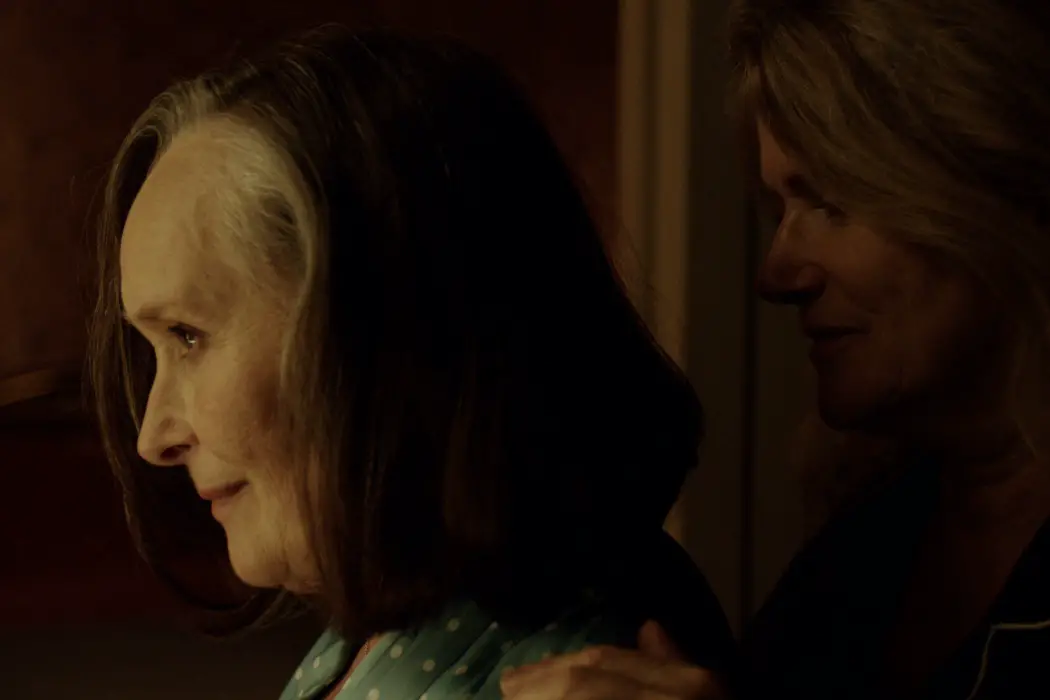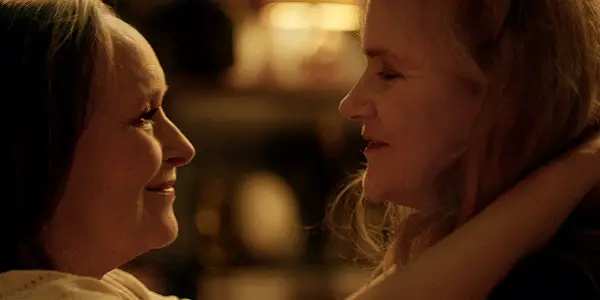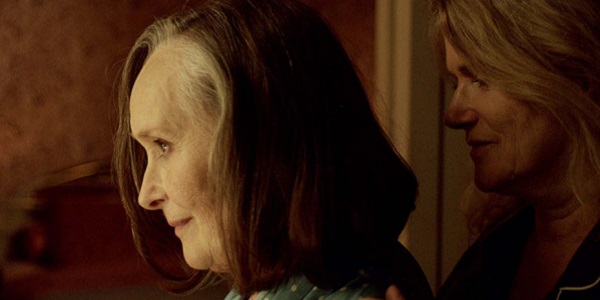TWO OF US: Love in Sickness And In Health

Lee Jutton has directed short films starring a killer toaster,…
France’s submission for Best International Film at this year’s Academy Awards is an intense drama about two women secretly in love, but before you jump to any conclusions, it is not Portrait of a Lady on Fire. (That was eligible last year, and passed over by France in favor of Ladj Ly’s Les Misérables.) The debut narrative feature from writer-director Filippo Meneghetti, Two of Us provides a stirring look at the longtime love between two older women and the way it is put to the test by a health crisis. With a story hinged on the disapproval and disappointment of others, some of the plot twists feel startlingly retrograde for a film about a lesbian couple in the twenty-first century, but an absolutely brilliant lead performance from the legendary Barbara Sukowa makes it impossible to stop watching regardless.
Across the Hall
Madeleine Girard (Martine Chevallier) and Nina Dorn (Sukowa) are two French women of retirement age who live in flats across the hall from each other on the top floor of a Paris apartment building. Yet they aren’t just neighbors; they’re also lovers and have been for decades. Nina, a free-spirited German woman and former tour guide, met Madeleine in Italy many years ago and followed her back to France; together, they dream of selling their flats and moving away to Rome, the place where they first fell in love.
However, Madeleine is afraid to tell her two adult children that she plans to sell the flat — especially since she hasn’t even told them she’s in a loving, passionate relationship with another woman. Both children view their father, a domineering figure who has since passed away, as their mother’s one true love, and Madeleine is loath to inform them otherwise. When Nina learns of her cold feet, she explodes at her in the street, telling Madeleine that the only person afraid of elderly lesbians anymore is Madeleine herself.

Unfortunately, before Nina and Madeleine have a chance to reconcile, Madeleine suffers a debilitating stroke. Madeleine’s assertive daughter, Anne (Léa Drucker), takes charge of her mother’s life, hiring a live-in caretaker (Muriel Bénazéraf) who cannot understand why “Mrs. Dorn” from across the hall is obsessed with visiting Madeleine every chance she gets and constantly interfering in her care. Watching Nina seize every sliver of opportunity to sneak across the hall and see the woman she loves in her darkest hour is heartbreaking, but the agony doesn’t end there. Soon, Anne figures out what’s going on between the two women, and the bombshell of the discovery nearly shatters her. But not even Madeleine’s own blood can stop Nina from doing what she thinks is best for her soul mate.
Love and War
In the first act of Two of Us, the protagonist appears to be the quiet, mannered Madeleine, but after her stroke, the film’s focus quickly turns to the fiery Nina and her increasingly misguided — indeed, borderline dangerous — attempts to see Madeleine. She quickly butts heads with the caretaker, sabotages her in an attempt to get her fired, and settles for blackmailing her instead. This startling (and stressful!) veer into thriller territory feels wholly unnecessary, a feeling that is only further emphasized by Michele Menini’s jarring musical score.
Watching two older women navigate the way aging and illness affect their relationship — especially when those women are played by Chevallier and Sukowa, and gorgeously shot by cinematographer Aurélien Marra — would provide more than enough to keep audience members engaged in the story without adding extra dramatic twists and turns. Yet Meneghetti isn’t done punishing our two heroines there. When Anne discovers that her mother has been in a long-term lesbian relationship, she is so disturbed that she goes out of her way to remove Madeleine from Nina’s sphere, even at the expense of Madeleine’s improving condition. This does give us a remarkable scene in which a desperate Nina confronts Anne at her home and tells her exactly how her mother really felt about her father, but it mostly feels like emotional torture porn.

I am not going to pretend that LGBTQ+ people are fully accepted by everyone in our society, or that all adult children would embrace learning such things about their parents without conflict. Yet watching Madeleine and Nina essentially be punished for being in love — over and over again over the course of the film — feels like something better suited for a mid-century melodrama than a modern one. It’s not the “killing your gays” trope, but it feels like a more subtle variation on it, and it is truly difficult to watch. Yet that also speaks to how easy it is to be invested in Madeleine and Nina, and how realistic their love story feels despite minimal backstory only slowly trickled out over the course of the film. That credit goes entirely to the two lead actors, whose chemistry is warm and lived-in throughout the film; even when Madeleine is unable to speak following her stroke, one can sense the love emanating from her when Nina is in the room.
Speaking of mid-century melodrama: Barbara Sukowa made her name as one of the muses of the great Rainer Werner Fassbinder (and other luminaries of the New German Cinema movement), so it’s hard to think of an actor better suited for the intensity of this material. As Nina, she lights up the screen, long hair swirling around her face like a manic lion’s mane as she channels her entire energy into helping Madeleine get well. The most out-there actions feel a little more realistic when Sukowa is the one carrying them out. Even as the various anxiety-inducing plot twists increasingly exhausted me, Sukowa kept me watching until the film’s final, beautiful moments.
Conclusion
In the long tradition of many Oscar submitted-films before it, Two of Us tries to do too much, which is a shame given that at its heart is a simpler and more beautiful love story than the tangled, torrid one depicted here.
What do you think? What’s your favorite Barbara Sukowa performance? Share your thoughts in the comments below.
Two of Us opens in virtual cinemas and select theaters across the U.S. on February 5, 2021. You can find more international release dates here.
Watch Two of Us
Does content like this matter to you?
Become a Member and support film journalism. Unlock access to all of Film Inquiry`s great articles. Join a community of like-minded readers who are passionate about cinema - get access to our private members Network, give back to independent filmmakers, and more.
Lee Jutton has directed short films starring a killer toaster, a killer Christmas tree, and a not-killer leopard. Her writing has appeared in publications such as Film School Rejects, Bitch: A Feminist Response to Pop Culture, Bitch Flicks, TV Fanatic, and Just Press Play. When not watching, making, or writing about films, she can usually be found on Twitter obsessing over soccer, BTS, and her cat.












